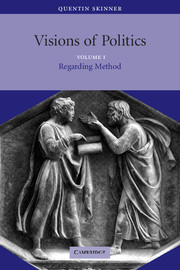Book contents
- Frontmatter
- Contents
- General preface
- Full Contents: Volumes 1–3
- Acknowledgements
- Conventions
- 1 Introduction : Seeing things their way
- 2 The practice of history and the cult of the fact
- 3 Interpretation, rationality and truth
- 4 Meaning and understanding in the history of ideas
- 5 Motives, intentions and interpretation
- 6 Interpretation and the understanding of speech acts
- 7 ‘Social meaning’ and the explanation of social action
- 8 Moral principles and social change
- 9 The idea of a cultural lexicon
- 10 Retrospect : Studying rhetoric and conceptual change
- Bibliography
- Index
2 - The practice of history and the cult of the fact
Published online by Cambridge University Press: 05 September 2012
- Frontmatter
- Contents
- General preface
- Full Contents: Volumes 1–3
- Acknowledgements
- Conventions
- 1 Introduction : Seeing things their way
- 2 The practice of history and the cult of the fact
- 3 Interpretation, rationality and truth
- 4 Meaning and understanding in the history of ideas
- 5 Motives, intentions and interpretation
- 6 Interpretation and the understanding of speech acts
- 7 ‘Social meaning’ and the explanation of social action
- 8 Moral principles and social change
- 9 The idea of a cultural lexicon
- 10 Retrospect : Studying rhetoric and conceptual change
- Bibliography
- Index
Summary
British historians are notoriously suspicious of philosophical reflections about the nature of their craft. The charge is no doubt exaggerated, but it is hard to deny that they have sometimes gloried in presenting themselves as straightforward empiricists for whom the proper task of the historian is simply to uncover the facts about the past and recount them as objectively as possible. Despite the inroads of post-modernist culture, this characterisation continues to hold good for many practitioners, and lately their outlook has been defended anew in recent theoretical work. Among those who have not only adopted this stance but have offered a theoretical justification of it, by far the most eminent in recent times has been Sir Geoffrey Elton, who always combined his large and distinguished output as an historian of early-modern Europe with a forthright willingness to reflect on the nature of historical enquiry, a topic on which he published no fewer than three books. While this readiness to come forward as a philosopher of history was unusual, Elton's actual philosophy was a reassuringly familiar one: he presented himself at all times as an unashamed exponent of the cult of the fact. Elton's theoretical writings may thus be said to offer a particularly illuminating means of assessing the strengths and weaknesses of this approach, and it is accordingly on his vision of the historian's task that I shall concentrate in what follows.
- Type
- Chapter
- Information
- Visions of Politics , pp. 8 - 26Publisher: Cambridge University PressPrint publication year: 2002



